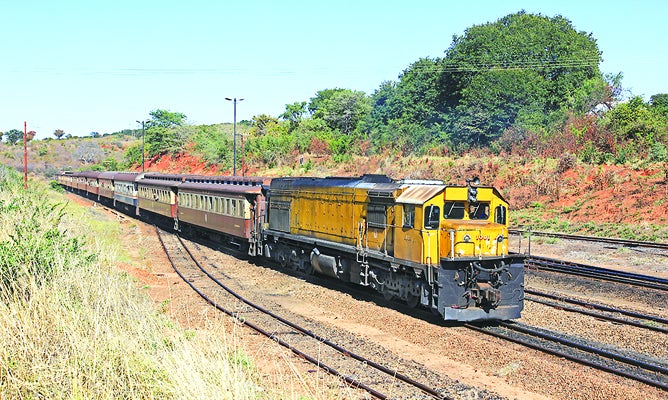LAST week’s dramatic cancellation of the US$400 million recapitalisation of the moribund National Railways of Zimbabwe (NRZ) became the latest episode in a series of hyped government projects that ultimately fail to take off owing to corruption and greed as well as competing self-interests among the political elite and senior bureaucrats.
After a cabinet sitting last week, government announced the project will be re-tendered because the initial winners of the tender, Diaspora Infrastructure Development Group (DIDG) and South African rail, ports and pipeline utility Transnet, had failed to raise the required funds. The cancellation of the deal — albeit a new twist this week about what actually happened — came at a time DIDG had agreed on a syndicated loan with the African Export-Import Bank (Afreximbank), which had been appointed as the lead arranger.
Afreximbank had agreed to coordinate funding and provide US$100 million with the balance set to come from South African and regional banks which had provided term sheets for about US$1 billion.
Even more startlingly, the development came just days after President Emmerson Mnangagwa met with Afreximbank president Benedict Okey Oramah on the sidelines of the United Nations General Assembly in New York early this month and assured him that his government was committed to the implementation of the deal.
Mnangagwa also highlighted during his state-of-the-nation address and the official opening of the 2nd Session of the 9th Parliament on October 1 that the money required for the project had been secured through DIDG.
At the centre of the raging storm is Transport minister Joel Biggie Matiza, who, as repeatedly reported by the Zimbabwe Independent in its exclusive series on the protracted transaction has been making systemic moves to derail the project and bring in via the back door a Dubai-based entity, Feonirich Investments LLC, which had failed to meet the tender process deadline when the deal was initially tendered in 2017.
This has raised fears that Matiza could be conflicted in the deal as he has fought tooth and nail to get it cancelled.
Zimbabwe’s major deals have for some time been punctuated with allegations of corruption, the involvement of shadowy companies with no capacity to undertake the works and highly controversial individuals who run mafia-style cartels that seek to circumvent legal channels and sneak in through the back door.
The deals always get frenzied publicity on inception, especially in the state-controlled press where they are touted as epoch-defining but eventually run into structural and bureaucratic problems.
Just like NRZ, Ziscosteel used to be a huge company, contributing immensely to the country’s economy. At its peak, it employed 4 000 people and produced one million tonnes of steel, some of which was exported.
Then, corruption and harsh economic factors severely crippled the steelmaker, resulting in it ceasing operations in 2008.
Government engaged Indian firm Essar Africa, which had committed to investing US$750 million. A commissioning event presided over by former president Robert Mugabe took place amid pomp and fanfare.
But the deal kept running into blind corners, marred by sticking issues over iron ore reserves to be given to the Indian firm, guarantees for access to power, water and railway system and its huge stock of domestic and foreign debts.
Government had agreed to sell 54% of its shareholding in Ziscosteel and 80% of its stake in BIMCO, which holds the iron ore mineral rights, to Essar Africa.
Subsequently, former finance minister Patrick Chinamasa, in 2015, announced government was calling it off and said the authorities would look for a new investor. There were reports of a huge fight in cabinet as ministers jostled to corruptly benefit from the deal.
To date, the investor has not been found.Another curious case is that of Nigerian billionaire investor Aliko Dangote whose much-hyped US$1 billion investment visit to Harare in 2015 ended in shame after he retreated after political bigwigs reportedly pressured him to “grease their palms” as an inducement to facilitate investment deals.
Add to that the enduring drama surrounding the deal for the rehabilitation of the Chirundu-Beitbridge highway which has been tendered and re-tendered by different transport ministers since 2005.
After several false starts, most Zimbabweans thought the deal would finally take off when Austrian firm Geiger International was awarded the tender in 2016. A groundbreaking ceremony presided over by Mugabe was held at Chaka Business Centre, but soon afterwards the project ran into problems, resulting in it being cancelled.
There is also the Gwanda Solar Power Plant that has not materialised after controversial businessman Wicknell Chivayo, a convicted fraudster, won the tender and was accused of spending US$7 million under unclear circumstances.
There is one striking aspect in all these deals: they tend to collapse whenever a new minister takes charge as he/she prefers to start afresh. This has raised questions about government’s policy thrust, institutional memory and continuity.
Analysts say these developments have serious effects on Zimbabwe’s efforts to reboot its economy.
“It smacks of weak design processes that are at the whim of individual ministers. Change of ministers is often associated with such changes since they treat their ministries as their fiefdoms,” economist Godfrey Kanyenze said.
University of Zimbabwe political science professor Eldred Masunungure said politicians were the single biggest obstacle to attracting new investors to the country because of their tendency to meddle with processes and cause policy uncertainty.
“I don’t think any rational investor would rush to invest in a country where policies mutate with each new minister. It is mostly about the ministers’ undue interference that drives us to suspect that they have vested personal interests in these tenders. It’s essentially about the politics of eating and looting which characterise these deals and not rational economic decisions,” he said.
The same sentiments were echoed by economist John Robertson, who said the NRZ deal cancellation was the ultimate indicator that Mnangagwa’s government is performing so badly it was squandering any chance of development.
“This sends a very bad signal. When you are an investor, the last person you want asking questions is the politician. Mostly, they want to make money without working for it and that is why they always want to be involved in making every decision,” Robertson said.






